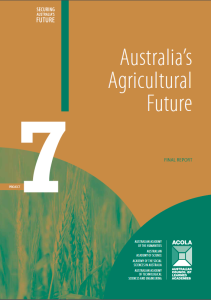ACOLA report on Australia's Agricultural Future
Food Values Research Group convener Professor Rachel Ankeny recently contributed to the Australian Council of Learned Academies (ACOLA) report Australia's Agricultural Future.
The report was co-authored by a multi-disciplinary team of scholars from across the physical and social sciences, acknowledging the complex nature of questions concerning the future of agriculture in Australia.
The report recognised that while Australian agriculture is presented with opportunities for growth in both export and domestic markets, it is also facing increasing environmental, social, and economic pressures. In order to harness opportunities, these barriers must be considered "in the context of complex social and political issues around rural and regional Australia."
While the agricultural sector shares many needs with other industries - a skilled workforce, high-quality infrastructure, improved technologies and communications, and access to financing - it also faces distinctive challenges. The report states: "Agriculture does face unique challenges due to the special status of food, our relationship to the land, and agriculture's importance for the prosperity for rural and regional Australia." Expert working group chair Dr Joanne Daly PSM FTSE further observed that agriculture has a special place due to our deep connection with food, but there are increasingly higher expectations from the broader society.
In a speech at the launch of the report, Australia's Chief Scientist Professor Ian Chubb AC noted, "it would be wrong to think that we can have a line in the budget for Agricultural Research, and consider the future of farming secure. We need research in many disciplines, as well as cross-disciplinary teams combining knowledge in entirely new ways." The co-authors agree strongly that the issues associated with Australia's agricultural future clearly require multiple methods and approaches.
But a successful agricultural future for Australia is not about research alone. It also requires public engagement with and support of our food and fibre industries. As Professor Chubb observed, "it relies on an informed community: able to have an intelligent conversation, with the benefit of evidence that we interpret with understanding."
The report indicates that demand is likely to increase for Australian agricultural products, and the potential for the industry to meet this demand is largely positive. However it is important to recognise the growing number of social, economic, and environmental stressors facing Australian agriculture. The report therefore recommends, among other things, that "Australia needs to address the erosion of its 'social licence to operate' in the agricultural and food sectors." To address this important issue, "there is a need for a shared, positive vision and narrative for agriculture in Australia."
In her recent commentary on the Federal Government's Science and Research Priorities, published in The Conversation, Rachel underscored the importance of social science research to secure the future of agriculture in Australia. "Agricultural communities face challenges to their resilience, in part due to threats to their 'social license to operate'", Rachel observed. "Sectors of the public are increasingly anxious about contemporary agricultural practices and their potential impacts on health, animal welfare and the environment."
Rachel further observed, "the call to develop production capacity requires scrutiny not just as a technical problem, but in its broader socio-cultural context."
Professor Kym Anderson AC from the University of Adelaide's Global Food Studies group was also a co-author of the report, contributing economic perspectives on the future of agriculture in Australia.
ACOLA report on Australia's Agricultural Future

